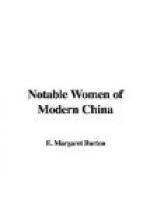Mrs. Ahok was a very devout Buddhist and had no desire at all to learn of Christianity. She was, however, eager to learn English, and consented to learn it through the Bible, since Miss Foster, the English missionary who had been asked to instruct her in English, would consent to give time from her other work only on that condition. “I have often found her with the house full of idols, incense being burned before them,” reads a letter from one of her friends. “Our hearts were often discouraged, fearing that this Chinese lady would always love the idols.” Even after her husband had become a Christian Mrs. Ahok insisted that she would never forsake the worship of her ancestors and follow the foreign religion. “But,” said Mrs. Baldwin, “I felt very sure that a woman of her mind and character would yet follow her husband into the better life. Within a year after, she became a most earnest, loving, working disciple of Christ, ready to deny herself and bear her cross in many ways most trying to a Chinese lady.”
Both Mrs. Ahok and her husband had intense opposition to meet, for it was not to be expected that members of families of such high rank should forsake the religion of their fathers without encountering bitter protest from their kindred. The opposition of mother and mother-in-law, both of whom lived in the home with them, was especially hard to bear. Mrs. Ahok’s mother was intensely hostile to Christianity, and did everything possible to make things so unpleasant for her daughter that she would renounce her new faith. Mr. Ahok’s mother was no less opposed at first; but gradually she became more willing to learn about Christianity, and for some time alternated between her idol worship and the Sunday and mid-week services and family prayers which Mr. Ahok held in his home. At length, after having thus compared the two religions for some time, she announced: “You may take my idol away. Hereafter your God shall be my God.” From that time on she was a radiant Christian, and it was not long until Mrs. Ahok’s mother followed her example.
At the time of the death of Mr. Ahok’s mother, there occurred an interesting example of the way in which a Chinese can become an earnest Christian without becoming less Chinese thereby. In that part of China the wealthy families, and many of those of the middle classes, begin on the seventh day after a death a series of “meritorious” ceremonies for the repose and general benefit of the soul of the departed. In one form or another the ceremonies are repeated every seventh day thereafter until the forty-ninth day. Buddhist or Taoist priests are hired to conduct the ceremonies. Mr. Ahok, probably partly that he might not antagonize his relatives and friends by a disregard of their funeral customs, partly because of the opportunity for spreading the knowledge of Christianity thus afforded, followed the custom of having such a gathering every seventh day. But instead of non-Christian ceremonies being held, the truths of Christianity were preached.




